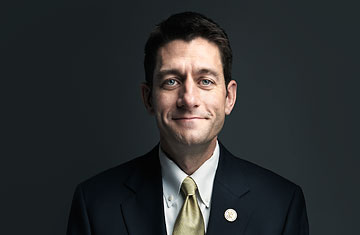
Paul Ryan
(2 of 2)
Here's what Ryan came up with:
Health Care for Seniors. Ryan estimates he'd save more than $2 trillion over the next decade by transforming the government's two major health care programs and repealing Obama's 2010 health care law. Medicare, which provides health care for more than 45 million American seniors, already consumes about an eighth of federal spending, and its costs are set to explode as the baby boomers start retiring. Ryan would phase out Medicare's current mechanism, which reimburses health care providers without payout limits for patients, and begin federal payments to private health plans chosen by future seniors. Republicans say that competition would lower prices — and that seniors who can't count on automatic coverage will be more judicious about their health care consumption, which would also lower costs.
Critics worry that Ryan won't give seniors enough money to take care of themselves. His plan would cap Medicare payments at a rate slightly above inflation, far less than the rate health care costs are projected to grow — meaning that seniors would pay much more of the health care burden out of their own pockets (although Ryan's plan would provide extra assistance to some low-income seniors).
Ryan has partly insulated his vision from electoral blowback by exempting Americans 55 and over from any changes to their Medicare coverage, although GOP operatives worry that Democratic attacks will lead current seniors — who have the highest voter turnout — to believe otherwise.
Health Care for the Poor. Ryan would also blow up the Medicaid program, which gives health care to more than 50 million Americans, mostly poor and disabled. He would save $771 million over the next 10 years by cutting Medicaid and sending it as a block grant to states, which would be given new flexibility on how to spend the money. Some may find creative savings, but many — especially those under GOP control — are likely to cut benefits.
Taxes and Other Spending. Ryan proposes a scrubbing of the tax code that would wipe out hundreds of complex loopholes and apply the savings to lower income tax rates for everyone. (He would lower the top tax bracket from 35% to 25%.) But he wouldn't raise any new tax revenue — in part because new taxes are anathema to the GOP faithful. Ryan does not ask the wealthy or Big Business to help with the budget rescue; such a move, he says, would smother job growth. To the contrary, Ryan's plan would extend the Bush tax cuts on the wealthiest Americans, now set to expire in 2013, which would forgo $700 billion in revenue over 10 years.
Ryan also wants deep budget reductions in nearly every category, saving up to $925 billion by cutting spending back to 2008 levels and freezing it there for five years. That's quite a dramatic sum when you consider how much Congress has been fighting over a few tens of billions of dollars in this year's budget. The White House has been quick to point out that those cuts would hit popular programs, including Pell Grants to make college more affordable. A big exception is defense spending: Ryan endorses only the cuts already planned by Defense Secretary Robert Gates, amounting to $78 billion over five years. Many defense experts believe the Pentagon could safely slash many times that amount.
And although Ryan is being called courageous for taking on Medicare and Medicaid, his plan punts on perhaps the most electrified political rail of all: Social Security. That program is still solvent, but as millions of baby boomers retire, it's going to start running big deficits. Ryan has talked before about reforming Social Security, but his latest plan simply calls for bipartisan action down the road. (He's also been criticized for peddling fuzzy math and rosy projections. A Washington Post fact check deemed his budget full of "dubious assertions, questionable assumptions and fishy figures.")
Even if lawmakers find the courage to act, Ryan's plan won't become law in anything like its current form. As long as Democrats control the Senate — at least through next year — no budget deal will be adopted without an O.K. from the Obama White House. (The 2010 health care law, for instance, won't be repealed so long as Obama holds a veto pen.) After that, it is harder to predict, but even some of Ryan's GOP colleagues are nervous about taking on entitlement programs. Ryan's backers say they have to start somewhere, however. "When you win an election, you have a responsibility to lead," says Republican Congressman Steve LaTourette of Ohio. Says Republican Senator Tom Coburn of Oklahoma: "If we don't do something on deficit reduction, [we] won't be here in a couple of years."
That's why Ryan's vision could provide a blueprint in the coming months for a grand budget deal between the parties later. The U.S. will reach its federal borrowing limit in early July and will default on its debt without a congressional vote authorizing more borrowing. Some Republican leaders want to tie major spending reductions to any such vote, although Obama officials discourage such talk.
The great unknown is whether the two parties are prepared for the kind of honest debate Ryan says Americans deserve. Can Democrats accept any significant cuts to entitlement programs? Will Republicans ever tolerate tax hikes? Obama said on April 5 that he's "looking forward to having that conversation." But in the shadow of the 2012 presidential campaign, in which both sides will be elbowing for any political advantage, that's not going to be easy.
